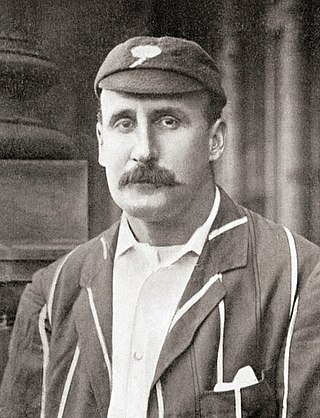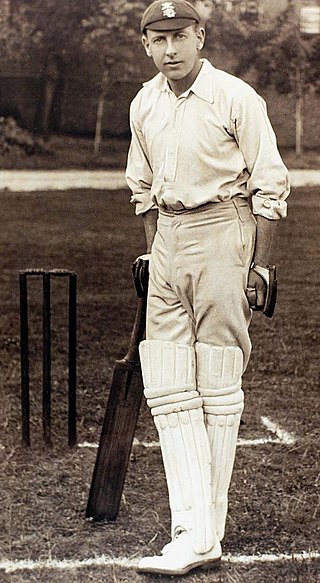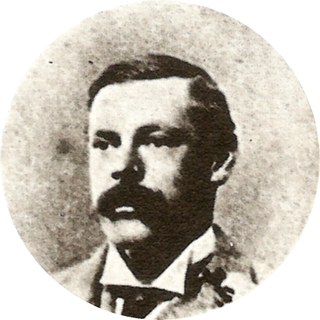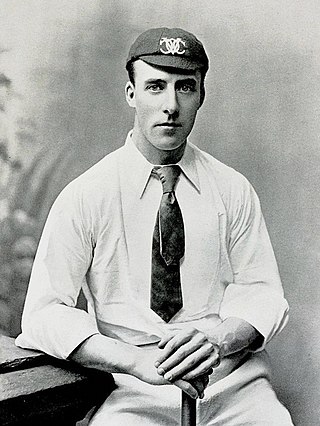Related Research Articles

Martin Bladen Hawke, 7th Baron Hawke, generally known as Lord Hawke, was an English amateur cricketer active from 1881 to 1911 who played for Yorkshire and England. He was born in Willingham by Stow, near Gainsborough, Lincolnshire, and died in Edinburgh. He appeared in 633 first-class matches, including five Test matches, as a righthanded batsman, scoring 16,749 runs with a highest score of 166 and held 209 catches. He scored 13 centuries and 69 half-centuries.

Sir Henry Dudley Gresham Leveson Gower was an English cricketer from the Leveson-Gower family. He played first-class cricket for Oxford University and Surrey and captained England in Test cricket. His school nickname "Shrimp" remained with him through his life, but few cricket sources refer to him by anything other than his initials. He was a selector for the England cricket team, and a cricketing knight.
Arthur Haygarth was a noted amateur cricketer who became one of cricket's most significant historians. He played first-class cricket for the Marylebone Cricket Club and Sussex between 1844 and 1861, as well as numerous other invitational and representative teams including an England XI and a pre-county Middlesex. A right-handed bat, Haygarth played 136 games now regarded as first-class, scoring 3,042 runs and taking 19 wickets with his part-time bowling. He was educated at Harrow, which had established a rich tradition as a proving ground for cricketers. He served on many MCC committees and was elected a life member in 1864.

Walter Morris Bradley, known as Bill Bradley, was an English amateur cricketer who played in two Test matches in 1899. He played for Kent County Cricket Club between 1895 and 1903.

Herbert Tremenheere Hewett was an English amateur first-class cricketer who played for Somerset, captaining the county from 1889 to 1893, as well as Oxford University and the Marylebone Cricket Club. A battling left-handed opening batsman, Hewett could post a large score in a short time against even the best bowlers. Capable of hitting the ball powerfully, he combined an excellent eye with an unorthodox style to be regarded at his peak as one of England's finest batsmen.
John Lindsay Bryan was an English schoolteacher and cricketer who played for Cambridge University and Kent County Cricket Club. Bryan served in the British Army in both World War I and World War II and won the Military Cross in 1918.

William Nichols Roe was an English first-class cricketer who played for Somerset County Cricket Club and Cambridge University in the late 19th century. A right-handed batsman who could play aggressively, but with a sound defensive method, Roe was considered one of Somerset's leading batsmen of the era. He played without merit for Cambridge, and only achieved his Blue during his final year at the university.

Ernest Smith was an English amateur first-class cricketer, who played twenty one games for Oxford University from 1888 to 1891, 154 matches for Yorkshire County Cricket Club from 1888 to 1907, and four for the Marylebone Cricket Club (MCC) from 1892 to 1902.
Richard Edwardes More was an English cricketer. A right-handed batsman and right-arm medium pace bowler, he played first-class cricket for Oxford University and Middlesex, amongst others, and later played for the Egypt national cricket team while he was working for the Sudan Civil Service.

John Edward Raphael was a Belgian-born sportsman who was capped nine times for England at rugby union and played first-class cricket with Surrey. He was a Barrister by profession and a Liberal politician.

Robert Christian Ramsay was an English-born pastoralist and businessman who worked in Queensland, Australia. During the late 1880s, he was also an amateur cricketer who played for Harrow, Cambridge University and Somerset. In 1882, he also played for the Gentlemen of England under W.G. Grace.

Robert Henry Lyttelton was an English cricketer who appeared in seven first-class matches between 1873 and 1880. A member of the Lyttelton family who were prominent in English cricket in the mid to late 1800s, he did not play county cricket, but appeared for a number of representative sides, in which players were often chosen more for their social status than their cricketing ability. In his later years he was known for his views about sportsmanship in cricket, and he successfully campaigned for changes in the laws of the game to penalise blocking the wicket with the legs. He published two books about cricket and collaborated with others on two more.

Malcolm Robert Jardine was an English first-class cricketer who played 46 matches, mainly for Oxford University. Although his first-class record was not impressive, he scored 140 in the University Match of 1892 using an unorthodox batting method. He played a few matches for Middlesex but later went to work in India, in effect ending his English first-class career. He played first-class cricket in India for the Europeans and after a successful legal career, returned to England. His son Douglas went on to play cricket for Oxford, Surrey and England, captaining the latter two and being associated with the use of Bodyline bowling.

Vivian Frank Shergold Crawford was an English cricketer who played as a right-handed batsman and an occasional right-arm fast bowler in first-class cricket for Surrey and Leicestershire between 1896 and 1910. He also played for many amateur teams. He was born in Leicester and died at Merton, Surrey. He was the brother of the England Test cricketer Jack Crawford and of the Leicestershire first-class cricketer Reginald Crawford.
Christopher John Aworth is a retired cricketer for Surrey and Cambridge University. A left-handed batsman and occasional left-arm spin bowler born in Wimbledon, Aworth played for Surrey's Second XI from 1971 before appearing for Cambridge against the MCC in 1972 and making his first-class debut for them against Warwickshire in 1973. In July 1974 he was selected for Surrey's First XI and debuted against Lancashire. He would play twenty-eight County Championship matches for Surrey, as well as eighteen one day games in the John Player League and Benson and Hedges Cup. He scored 67 in the semi-final of the 1976 Benson & Hedges Cup. For Cambridge he made thirty-one appearances in total. Across his first-class career, he scored 2,552 runs including three centuries. His professional career ended in 1976 with matches against the British Army.
Lestock Handley Adams was an English first-class cricketer who played for Cambridge University between 1908 and 1910. Six of his games attained first-class status, and in these he took 17 wickets and scored 61 runs. Born in Ormskirk, in Lancashire, he was a gentlemen cricketer who played for the Gentlemen of England and various representative teams. Emigrating to Canada, he served in the armed forces during World War I, and was killed in Placaut Wood, France aged 30.
William Seeds Patterson was an English cricketer who played first-class cricket for Cambridge University, Lancashire and various amateur teams between 1874 and 1882. He was born at Mossley Hill, Liverpool and died at Hook Heath, Woking, Surrey.

Edwin James Diver was an English first-class cricketer who played for Surrey and Warwickshire between 1883 and 1901. He was born in Cambridge and died at Pontardawe, Glamorgan, Wales.
Frederick Gale was an English cricket writer and cricketer who played in two first-class cricket matches in 1845.
References
- 1 2 "Player Profile: Robert Baily". Cricket Archive. Retrieved 16 April 2014.
- ↑ "Teams Played For". Cricket Archive. Retrieved 16 April 2014.
- ↑ BAILY, Robert Edward Hartwell, Who Was Who, A & C Black, 1920–2015; online edn, Oxford University Press, 2014